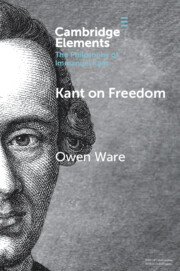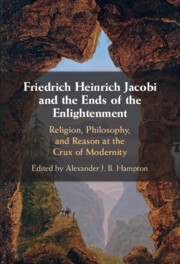55 results
14 - Is a Deterministic Completion of Quantum Mechanics Possible?
-
- Book:
- The Einstein Paradox
- Published online:
- 14 November 2024
- Print publication:
- 28 November 2024, pp 223-234
-
- Chapter
- Export citation
15 - The Natural-Philosophical Foundations of Quantum Mechanics (Excerpt)
-
- Book:
- The Einstein Paradox
- Published online:
- 14 November 2024
- Print publication:
- 28 November 2024, pp 235-243
-
- Chapter
- Export citation
Compatibilism and Truly Minimal Morality
-
- Article
-
- You have access
- Open access
- HTML
- Export citation
7 - Quantum Mechanics and Our View of Reality
- from Part I - A Nonmathematical Exposition of Quantum Mechanics and Quantum Field Theory
-
- Book:
- Interpreting Quantum Mechanics
- Published online:
- 09 May 2024
- Print publication:
- 16 May 2024, pp 93-110
-
- Chapter
- Export citation
Thomist Libertarianism is Committed to Mysterianism
-
- Journal:
- New Blackfriars / Volume 106 / Issue 2 / March 2025
- Published online by Cambridge University Press:
- 28 March 2024, pp. 101-113
- Print publication:
- March 2025
-
- Article
-
- You have access
- Open access
- HTML
- Export citation
Chapter 14 - Carnap on Determinism and Free Will
- from Part IV - Science and Theories
-
-
- Book:
- Interpreting Carnap
- Published online:
- 01 February 2024
- Print publication:
- 08 February 2024, pp 270-285
-
- Chapter
- Export citation
Free Will, Foreknowledge, and Creation: Further Explorations of Kant’s Molinism
-
- Journal:
- Kantian Review / Volume 28 / Issue 4 / December 2023
- Published online by Cambridge University Press:
- 30 November 2023, pp. 497-518
- Print publication:
- December 2023
-
- Article
- Export citation
1 - Rationality and Closed-System Reasoning
- from Part I - The Materialist Utopias
-
- Book:
- Late Soviet Britain
- Published online:
- 14 September 2023
- Print publication:
- 28 September 2023, pp 23-50
-
- Chapter
- Export citation
Free Will: Helen Steward Interviewed by Stephen Law
-
- Article
-
- You have access
- Open access
- HTML
- Export citation
16 - Self-Cultivation
- from Part III - Media and Modes of Ethical Practice
-
-
- Book:
- The Cambridge Handbook for the Anthropology of Ethics
- Published online:
- 11 May 2023
- Print publication:
- 25 May 2023, pp 411-432
-
- Chapter
- Export citation

Kant on Freedom
-
- Published online:
- 17 May 2023
- Print publication:
- 08 June 2023
-
- Element
- Export citation
Probabilism: An Open Future Solution to the Actualism/Possibilism Debate
-
- Journal:
- Journal of the American Philosophical Association / Volume 10 / Issue 2 / June 2024
- Published online by Cambridge University Press:
- 14 April 2023, pp. 349-370
-
- Article
-
- You have access
- Open access
- HTML
- Export citation
6 - The Jacobi–Schelling Debate
- from Part II - Faith and Revelation: Debates on Theism, Atheism, and Nihilism
-
-
- Book:
- Friedrich Heinrich Jacobi and the Ends of the Enlightenment
- Published online:
- 09 February 2023
- Print publication:
- 16 February 2023, pp 104-123
-
- Chapter
- Export citation

Friedrich Heinrich Jacobi and the Ends of the Enlightenment
- Religion, Philosophy, and Reason at the Crux of Modernity
-
- Published online:
- 09 February 2023
- Print publication:
- 16 February 2023
Introduction
-
- Book:
- William Faulkner and the Materials of Writing
- Published online:
- 24 May 2023
- Print publication:
- 05 January 2023, pp 1-27
-
- Chapter
- Export citation
Chapter 15 - Free Will and Determinism
- from Part II - Ideas
-
-
- Book:
- David Foster Wallace in Context
- Published online:
- 18 November 2022
- Print publication:
- 01 December 2022, pp 159-168
-
- Chapter
- Export citation
Chapter 15: - Chaos and Complexity
- from Part I - Introduction to the Scientific Perspective on the Past
-
- Book:
- The Evolution of Everything
- Published online:
- 03 November 2022
- Print publication:
- 24 November 2022, pp 208-220
-
- Chapter
- Export citation
Chapter 1 - Why We Must Rethink Psychology
-
- Book:
- How Psychologists Failed
- Published online:
- 27 October 2022
- Print publication:
- 03 November 2022, pp 1-12
-
- Chapter
- Export citation
8 - Self-Control and Moral Responsibility
- from Part II - Implications for Society and Politics
-
- Book:
- Self-Control
- Published online:
- 20 August 2022
- Print publication:
- 08 September 2022, pp 170-214
-
- Chapter
- Export citation
Chapter 5 - John Rollin Ridge
- from Part I - Careers
-
-
- Book:
- American Literature in Transition, 1851–1877
- Published online:
- 15 June 2022
- Print publication:
- 23 June 2022, pp 74-90
-
- Chapter
- Export citation

